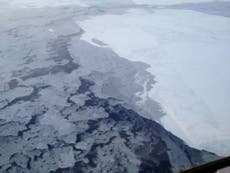Mea Culpa: a monster comparison we saved for a rainy day
John Rentoul on questions of style and usage in last week’s Independent


We journalists love our bags of sugar, double-decker buses and areas the size of Wales. We had an unusual outbreak of analogese last week. The standard measure of the volume of water is Olympic-sized swimming pools, but this time we reported that 3 October was the wettest day in the UK since records began, “with the level of rainfall exceeding the volume of water in Loch Ness”.
Full marks for trying, but how much water is that really, spread over the entire country? All I know is that Loch Ness is deep, which is why no one can find the monster, but the quantity is hard to relate to what happened on that date, which is that, even in London, it basically rained all day.
Whomsoever winneth: We had this headline on an economic opinion article: “Whoever wins the US election is not so important for the economy”. I could see it wasn’t right, although it was clear what it meant, and I couldn’t immediately work out what was wrong with it or how to fix it. The best I could do was: “Whoever wins the US election, the economy will do well over the next decade.”
Over or under: What is an overbridge, asked Mick O’Hare, one of our frequent correspondents. We reported that a road accident had happened “near a railway overbridge to the west of Oxford”. I thought that was all right, making it doubly clear that the railway goes over the road, rather than the other way round, although I would have assumed “a railway bridge” was a bridge over the road. The opposite would have been “near a bridge over a railway”.
Forensic report: My campaign against the use of “multiple” to mean “several” is going badly. We said that the New Zealand National Party “has had multiple leadership changes this year”; that Donald Trump “ignored multiple polls showing him losing Pennsylvania”; and we attributed a story about the French government putting pressure on the fashion industry to hold fashion week during a pandemic to “multiple sources”.
My view, and I am aware that this is a mere stylistic preference, is that “multiple” is ugly, whereas “several” is a pleasant plain English word. I suspect that the fashion for “multiple” has been encouraged by court reporting, because it is a word used by police officers, who presumably think that “several” sounds imprecise. But multiple is just as vague; it just sounds mathematical. And as if we are talking about stab wounds.

Join our commenting forum
Join thought-provoking conversations, follow other Independent readers and see their replies
Comments